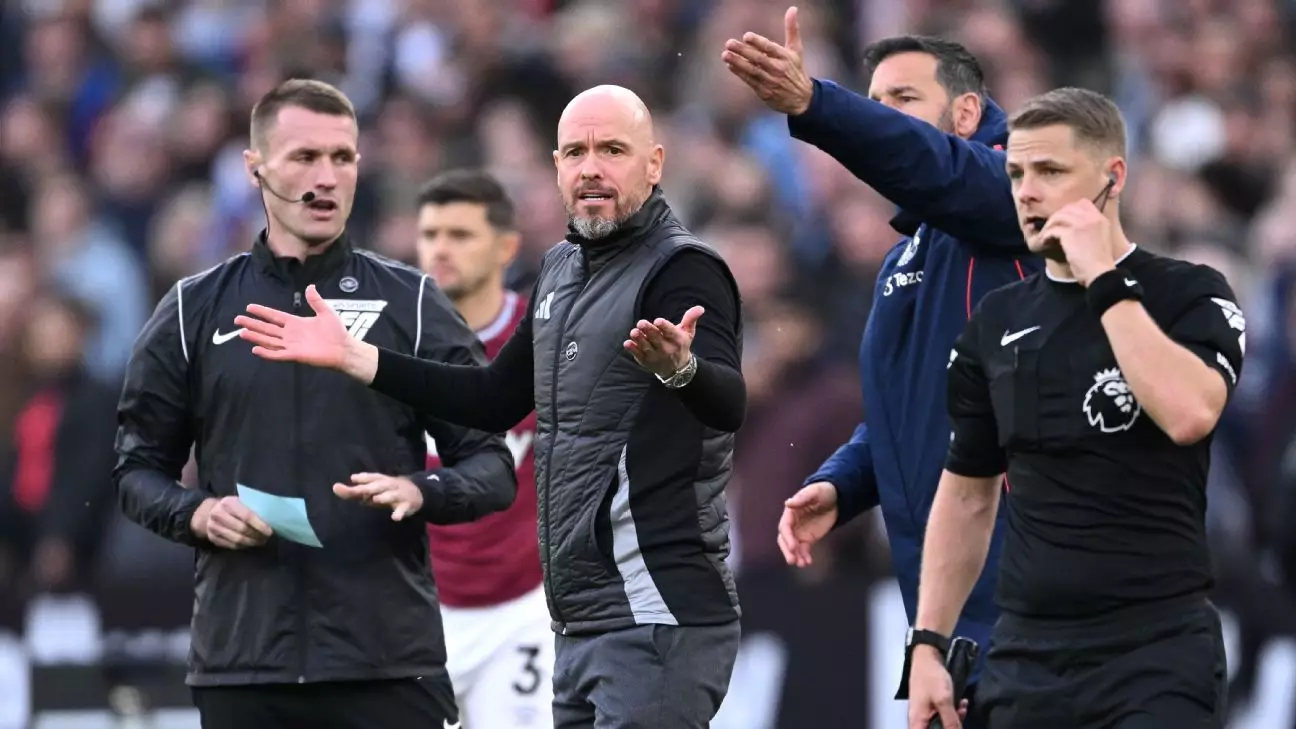Recent performances by Manchester United have cast a long shadow over the tenure of manager Erik ten Hag. Once considered a beacon of hope in a club riddled with inconsistency and underachievement, Ten Hag now faces the mounting pressure that comes from a series of disappointing outcomes. The situation escalated dramatically after a high-profile encounter against West Ham United, which culminated in a heartbreaking defeat marked by questionable officiating and critical errors on the pitch. This article delves into the layers beneath Manchester United’s current plight, examining the trends and decisions that have led the storied club into troubled waters.
In a 3-0 loss to Tottenham Hotspur, Ten Hag publicly stated he would “deny” the impact of the defeat, hinging his argument on the rescinded red card against Bruno Fernandes. While it is understandable for a manager to seek solace in refereeing errors as a means of protecting player morale, such a mindset doesn’t truly address the systemic issues plaguing the squad. Fast forward to the recent match against West Ham, where a late penalty decision tilted the scales in favor of the opposition, and one begins to wonder if Ten Hag’s defensive posturing is masking deeper vulnerabilities in the team’s gameplay.
The match against West Ham exhibited classic symptoms of Manchester United’s ongoing challenge: initial dominance that fizzled into disarray. Dominating the game for long stretches, United appeared to have the upper hand until Matthijs de Ligt’s fateful error proved catastrophic. The decision to award a controversial penalty not only shifted momentum but also exposed the fragility of a team that seems to crumble under pressure when faced with adversity. Thus, while Ten Hag’s grievances regarding officiating are valid, they do little to excuse the avalanche of errors that led to the defeat.
One of the most glaring deficiencies in Manchester United’s performance is their inability to convert opportunities into goals. Despite creating a plethora of chances, including 1.48 expected goals (xG) in the first half against West Ham, the players seemed to lack the killer instinct required at the highest level. Bruno Fernandes, Alejandro Garnacho, and Diogo Dalot had their moments but significantly failed to capitalize, leading to frustrations both on and off the pitch. Critically, Manchester United’s attacking output has spiraled to such lows that they find themselves among the bottom six in the league in terms of goal-scoring.
Ten Hag has been vocal about the team’s failures to finish chances, rightfully pointing to a lack of “cutting edge.” While it is essential for a coach to instill confidence and resilience in players, there comes a point where accountability must be recognized. For a player like Garnacho, whose output since his debut pales when compared to peers like Marcus Rashford, the burden of expectation can weigh heavy, drifting dangerously close to mediocrity.
With rising discontent among fans and media alike, questions about Ten Hag’s strategies are becoming more prominent. In matches such as those against Fenerbahce and West Ham, his choices and substitutions seemed reactive rather than proactive. The contrasting impact of West Ham’s halftime changes displayed a sense of tactical acumen that his squad lacked. With two crucial games against Chelsea and Leicester City looming ahead, Ten Hag must not only rally his players but also find a way to tweak his game plan to focus on both defense and attack.
Furthermore, how Ten Hag articulates these challenges in press conferences can have ramifications. While calling out lifeless officiating might earn him sympathy from certain quarters, it could also be perceived as a distraction from the core issues that require immediate attention in his team’s tactical setup.
The road ahead for Manchester United remains fraught with uncertainty, yet it is not without hope. Facing teams with poor records in the coming weeks offers an opportunity to regain confidence and erase the stigma of their current form. However, Ten Hag must tread carefully; the margins for error are thinning with every passing game. The challenge is not just internal but comes with external pressures from fans who crave a return to glory.
In a league where midtable teams can claim the scalp of giants on any given weekend, Manchester United must start to recognize and own their inconsistencies. If both the players and manager learn to navigate their obstacles with a sense of urgency and collective responsibility, then perhaps they can reshape the narrative that has unfolded around their performance. Building a winning mentality, rediscovering confidence, and addressing tactical shortcomings will be necessary in the weeks to come if the club hopes to break free from its current quagmire. As the saying goes, adversity often reveals character, and for Manchester United, the time for revelation is now.

